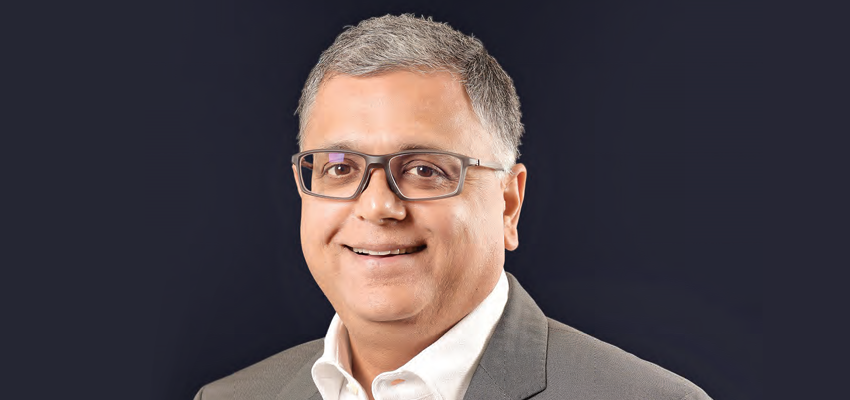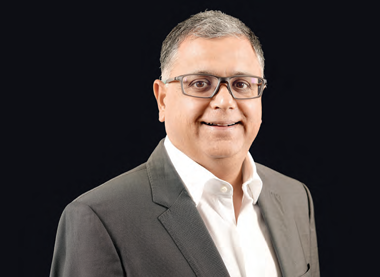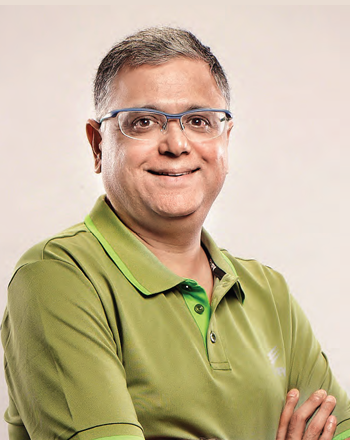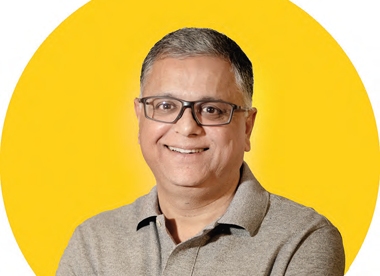Ace Investor

He is some who knows the premise of the stock market inside out. And he firmly believes, “Take the risk and be patient, as creating wealth is a marathon and not a 100-metre run.” Meet Prashant Desai, Senior Director, Everstone Capital; currently, seconded to Burger King India as Head of Strategy and Investor Relations. Prashant loves to embrace his failures and create something worthwhile out of them. He has worked with the who’s who of the financial market, and over the years, owing to his knowledge, experience, and the risks that he has taken, he was inspired to become one of the craftiest financial pundits.
In a conversation with the Corporate Citizen, Prashant candidly talks about his journey so far, the mistakes that he made and why one should embrace them, a few tips on how to invest in the stock market, and a lot more
"It’s a myth that one needs to be rich to invest. I feel you need to invest to be rich. This became my core quite early in life. I started earning in 1995. Since then, 100 per cent of salary after the basic expenses goes into the stock market"
Corporate Citizen: Can you begin by giving our readers an idea about your journey so far?
Prashant Desai: I was born in Dhanbad, the coal capital of India. As my father worked with the Bank of India, within a few years, he was posted in Kolkata. I spent three decades in that city, and I am proud to call it my hometown. Soon after I completed my graduation in Commerce, I went ahead to pursue a degree in Accounting and Finance from The Institute of Chartered Accountants of India. And in no time, my career took off in the stock market.
I vividly remember this, when we moved to Kolkata, my father had brought an apartment in a ten-storey building. It was one of those high rise buildings. In those days, as people liked to stay in independent bungalows, we received a decent discount while buying this flat. Each floor had seven apartments, so, in total there were 70 families. I made some great friends in my society. And these friends have now become a part of my family. Even today I am extremely close to them. I spent most of my childhood time playing with friends. So, yes, childhood was extremely fun. But on the flip side, it became a lot difficult when my father passed away. I was barely seven.
CC: How did this tragedy change you as a person? And how did you pull yourself out of this tragedy?
We had no choice, but to pull ourselves out of this tragedy. Before this tragedy, we were doing fairly well, financially. And from that we were pushed into something called abject poverty. We took some time to digest the reality. My father had a heart illness, and in those days, there was no cure for it. He underwent two major operations in Mumbai, which were expensive. As a result, he couldn’t leave us a lot of capital. To live in a financial crisis is one thing and to add to that we had to get accustomed to living without our father. Nothing can overcome the loss of your loved ones. Earnest regards to our friends and family, without them, it would have been utterly impossible to handle the loss. I realised the importance of friends and family at an early age. Most would think we spent our time sulking. But I’m glad to inform you that we had more happy days than sad. And that happened only because of my friends and family. We had endless chats and the support and love that they showered on us.
CC: Growing up in poverty, your single-minded focus was to become wealthy and successful. Which you clearly did. Tell us about this thought process.
I still remember, I must have been around 14. My friends and I used to chill out at our usual katta (hangout place). During one of our hangout sessions, the topic of ‘aspirations in life’ came up. When my turn came to answer, I was quick to respond, ‘I don’t want to be poor’. Back then, I did not know how I would do that, but I definitely did not want to be in the same position. To reach your goal when your path is laden with struggles, one needs to possess something called ‘fire in the belly’. I had that-since then, my single-minded focus was to do something big in life and be rich. That was the objective-The need for money is something that defined my childhood.
"The first and foremost thing that the industry taught me is-do something that you love. It’s very easy to get bored in life. The moment you get bored, your focus will waiver. And that reflects in your work"

CC: How has your hometown acted as a catalyst in your growth, and what did the city teach you?
Kolkata is my janmabhoomi. This city holds a special place in my heart as it helped me evolve into a better version of myself. Most of my friends and family still stay in Kolkata, which means my heart still belongs to that place. There are times when I still miss this city. On the flip side, it had its challenges. The way this city shaped me personally and professionally, was more on reverse psychology, meaning, it taught me what not to do. A few decades back, Kolkata was under the Left rule for over 25 years. During which, people were insinuated not to work. If you see some of the biggest industries and the industrialists originally hailed from Kolkata. It was the epicentre of commerce.
However, in those 25 years, they kind of killed the commerce. In those days, being rich was looked down upon. When I decided to get rich, the only way was through capitalism. That’s where my ideologies, which were being framed by where I was living, came at a crossroads with what my expectations in life were. Unfortunately, the bright talent of Kolkata had to leave this place for a want of better opportunities. So, on one hand, Kolkata taught me the importance of friends and family and on the other hand, it trained me on what not to do. I decided to move out of Kolkata in search of better opportunities.
CC: Your inclination towards finance is quite commendable. When and how did you fall in love with this field?
In all modesty and as cliched as it might sound, finance happened to me by chance. When my friends asked me how would I achieve my goal of becoming rich, I had no answer. Finally, after good years wait, I got my answer. It was sometime in 1994 when my brother was about to get married. So, whenever someone starts a new life, the state of your house plays a big role. We have been staying in the same house for 15 years and by now, it needed renovation. Then the golden question arose-where will the capital come from? While my brother and I were discussing the same, our mother came in with a bunch of share certificates. It was something that my father had invested in. I was clueless about the stock market and in all fairness, my brother did have some knowledge about it.
So, on a Sunday afternoon, we sat down to note down the details of the share certificates. In those days, the stock prices were printed in the newspaper. My brother handed me the job of simply multiplying the number of shares with the current price. While we did the math, our smiles kept getting bigger and bigger knowing the worth of our assets. And at the end of it, we both were jumping with joy because suddenly we realised, we were no more, poor. We had a reasonable amount of wealth and that completely shocked us. That night when I hit the bed, the mystery of stocks kept me awake. I was puzzled by the theory, and I thought to myself, ‘What is this thing where your wealth multiples even while you are sleeping’. My father had invested some money in the stock market, and we were thrilled to see it grow exponentially. I called up my Mama (maternal uncle) and decided to learn about it. After that, I visited him every day for a few minutes to understand the concept. And one fine evening while I was walking back home, I decided to build my career in the stock market. I knew it, if I want to be rich, this is what would help me. I had no reference points a few days back, but now I found a path.
It’s a myth that one needs to be rich to invest. I feel you need to invest to be rich. This became my core quite early in life. I started earning in 1995. Since then, 100 per cent of salary after the basic expenses goes into the stock market.
"To reach your goal when your path is laden with struggles, one needs to possess something called ‘fire in the belly’. I had that-since then, my single-minded focus was to do something big in life and be rich"

CC: What was that one corporate advice that changed your professional life forever?
In life one needs to be a Generalist: I will share two of the corporate pieces of advice that made me who I am today. This was back in 2003. The very first advice was given by Mr Kishore Biyani, founder and CEO, Future Group. Back then, it was called Pantaloon Retail. I used to market his brand to the investors, owing to which we had to travel a lot. This strengthened our bond. One of the things that he observed about me was, I looked at every situation in life through the narrow lens of the stock market. He made me realise that this thought process won’t take me far. Kishore said, “You always talk like a specialist, in life, one needs to be a generalist.” This sentence made no sense to me. A good soul that he is, he explained that to me with good sets of examples. I took that advice to my heart. Following this, I developed interest in other things in life. My love for cricket, music, art, reading, and other things, grew manifold. This small change helped me grow leaps and bounds.
There are no free lunches in life: Back when I moved to Mumbai, we had no roof over our heads. As you all know, buying a house in Mumbai is a huge task. I had just started working Mr Rakesh Jhunjhunwala, he is someone who needs no introduction. When I joined him, I was under the impression that I will get a huge signing bonus. And that cheque will help buy the house. He was the one to burst my bubble, while saying, “There are no free lunches in life. If you want something, you’ll have to work for it. If you want to buy a house, take a risk.” These two pearls of wisdom have stayed with me since then.
CC: On the same line, tell us about your experience of working with Mr Rakesh Jhunjhunwala.
Bhaiya, as I fondly call him, was sort of a genius. The way he looks at things is way beyond anyone’s imagination. I still remember, while working with him, he had asked me to recommend some stocks-something that the company could buy. I did the needful and asked him to buy a certain number of shares. Pat he asked, ‘How many stocks would you personally buy from the ones you recommended me?” He was gauging my connection over the stock. My number was barely anything as opposed to what I had suggested to him. To sum up, he judged me by the risk I’d take.
I learnt the things beyond any book would teach me. Once he brought one of the stocks that I had asked him. Within a month, it jumped 40 per cent. Seeing my joy, the wise man quickly dropped a comment, “It does not matter if you are right or wrong. What matter is how much money you made when you were right and how much you lost when you were wrong.” I honed a lot of skills just by observing him. He was a treat to watch.
CC: You have experience of over 25 years in this field. What do you take away from it?
Do what you love: The first and foremost thing that the industry taught me is-do something that you love. It’s very easy to get bored in life. The moment you get bored, your focus will waiver. And that reflects in your work. As opposed to when you love your work, it does not feel like a mundane 9-5 job. For instance, when it comes to managing a brand, it does not come naturally to me. But I still do it. However, when it comes to exits of IPOs, I love handling that task and I’m all game.
"I have seen that there is a disconnect in people’s perception of risk and reward. Everyone I meet wants to take a risk of a fixed deposit but wants a return of a stock market. If you want higher returns, you should take higher risks"

Take your time to find your niche: In today’s fast-paced world everyone is in a hurry to climb the ladder of success. I keep telling them to take their time to figure out what they love doing. If you are a part of the corporate world only 1-2 per cent will rise to the top. And if you want that, understand the thing that is common between those 1-2 per cent-they love their craft. It’s tough to rise when you don’t love your work. I joined this industry in 1995, and in 2003, I finally, found a ray of hope. It took me eight years to figure out my niche but when I figured it, it was a different ball game.
No risk, no gain: I have seen that there is a disconnect in people’s perception of risk and reward. Everyone I meet wants to take a risk of a fixed deposit but wants a return of a stock market. Wake up and smell the coffee-risk and reward are two parallel lines. If you want higher returns, you should take higher risks. Another thing I have observed is, people start judging when they see others succeed. They should understand that some take the risk to reach the top. You can either sulk or get inspired to take that risk. We live two lives, the second one begins when we realise, we have only one.
Time is of the essence: Creating wealth is like running a marathon, it’s not a 100-metre race. The moment you understand the importance of time, things will change. The problem is everyone wants things quickly and that’s when you end up making mistakes. There is something called the Power of Compounding. This concept works by growing your wealth exponentially. It adds the profit earned back to the principal amount and then reinvests the entire sum to accelerate the profit earning process.
I remember reading one of the responses given by Mr Warren Buffet. When asked what’s your wealth’s secret? He said, “My skill is investing, secret is time.” Today, everyone knows his worth. Over 90 per cent of his wealth came after the age of 75. The great thing about time is the deeper you get into it; the risk reduces significantly. The financial market is the only place where you can create wealth and it is simple too. It is simple because you don’t have to do a lot. If you close your eyes and invest Rs.10,000 in an Index Fund and wake after 20 years, voila, you’ll have made two crores. It’s simple, it’s not easy.
CC: In the recent past, the outbreak of Covid has been one of the biggest learning experiences for all. What did you learn from this situation professionally and personally?
For me, the lockdown was the inflation point of my life. Of course, I take this positively. So, when the lockdown hit us, I was just coming out of a failed venture. Because I incurred a great loss in the venture, I tried to hide the pain under the carpet. And during the lockdown was when I faced my demons. It gave me ample time to connect the dots. I encashed on this time to analyse what went wrong. And the result was something interesting. This analysis drove me to write a book, The Biography of a Failed Venture: Decoding Success Secrets from the Blackbox of a Dead Start-Up. This is one of the good things that happened to me during the pandemic.
Being a bookworm: Secondly, I started reading a lot. Before that, reading as a habit had become occasional owing to the workload. But because I had time, I got back to reading. I read a few books that transformed me as a person. Today, I’m Prashant 3.0 version, and the credit goes to the books that I read. These books taught me to have a purpose, to enjoy the smallest things in life, how to increase my productivity and focus, and the role grit plays in my life. The lockdown gave me time to do things that otherwise I wouldn’t have done. With that, I even did a course in speed reading. Earlier, I read 200 words a minute, now this has increased to 600. The more books I read, the more my connection, creativity, and imagination goes up. My learning curve has gone up. Covid has only added value to my life. It has given me clarity. Due to this personal growth, I have reached the optimal state of consciousness-where you feel your best and perform your best. In short, my happiness quotient has been enhanced.
Purposeful life: Now, there is a reason behind everything that I do. I have started living life with a lot more purpose. A few years back, I heard someone say-may you live a purposeful life. And now it rings the bell. Here, the purpose does not just mean earning money or doing charity. We ought to do things that give us happiness. I get up early, exercise, eat good food, enjoy time with my family, and this happiness reflects in my work. I work seven hours a day, and I have seen my productivity increase manifold. Covid, in a nutshell, has been a game-changer.
"In total, there is over Rs.40 lakh crore in the savings account in India. And this is making its owner poor by 80 lakh crore each year because it lies stagnant in a savings account. Imagine, the magic if we invest this level of money"
CC: You are a staunch advocate of spreading the essence of financial education. How according to you, can this subject be inculcated at the school level?

I’ll put this into three categories. I have two daughters-one is 10-year-old and the eldest is 18-year-old. I also have a 24-year-old niece. When I talk to my 10-year-old daughter, our financial conversations are completely different. It has nothing to do with investment. It is just to make them understand the true essence of money. They need to be taught that they have a choice and that they should exercise it. If I give her a budget of say Rs.1000, it is up to her to buy one toy, or three toys worth Rs.1000. It teaches them a lesson of being grateful and the importance of money, and that to earn money one must work. School curriculums should enlighten the students of fifth and sixth grade, about the broader understanding of money. They should know that to survive in this world, they need money. There are sacrifices that one needs to go through while earning money and supporting their family. Within that, the importance of saving should be taught.
Behavioural finance: The moment they are say 18 or 19, the conversation will automatically change. If I were to devise a course, I’ll make it mandatory for the students to carry their piggy bank. And every month, I’ll break it to see how much they have saved. If we talk to them about their experience, they will be more than happy to share their end of the story. And this will motivate others to do the same. Teens should be informed about savings, and how they can stop their spending frivolously. Taking them on the psychology journey of the marketeers will be an eye-opener. There is so much behavioural finance involved in this. Delayed gratification is important as well. I follow this with my elder daughter. So, she will get whatever she wants and there’s no budget for her wants. Whenever she asks for things, I just ask her to give me a valid reason behind buying whatever she wants. Most of her reasons are because her friends have them or owing to the pressure created by social media. I ask her to wait for 15 days, if she still wants it, I’ll buy her whatever she wants, and no questions will be asked. I’ve seen 80 per cent of her wants fall. Something that you want now, has no importance after some time. The saved money gets invested for greater gain.
Power of saved money: The financial chats with my niece are extremely mature. When my niece comes down to visit us, we share a hardcore conversation. At 24, she has a well-paying job, and she tries to save money as well. She has been saving a considerable amount of money. Making her understand the power of the saved money will take her far in life. I tell her about the investment options and the risks involved in them.
The magic of investment in the stock market: If I’m the school principal, I’ll make them understand that money is not bad. It makes your desires come true. For that, you should not fear it. Rather fall in love with it. This thought process must become mainstream. Let me tell you, in total, there is over Rs.40 lakh crore in the savings account in India. And this is making its owner poor by 80 lakh crore each year because it lies stagnant in a savings account. Imagine, the magic if we invest this level of money. In all fairness, India is not a poor country because of how the people are earning. It is poor because of how we are investing. Did you know that 45 per cent of American people invest in equities? In India, this number is less than 5 per cent. Before Covid, it was barely 2 per cent. The way you invest the money matters. It can make or break your life. The problem is we are not educated to take risks. If you don’t lose the money, how will you make money? People think of investing as gambling. If you righteously invest your money in the stock market, let it ripe for years and surely multiply your wealth. When you make time, risk comes down naturally.
"The way you invest the money matters. It can make or break your life. The problem is we are not educated to take risks. If you don’t lose the money, how will you make money? If you righteously invest your money in the stock market, let it ripe for years and surely multiply your wealth"

CC: Tell us what went wrong with your startup.
In 2017, Kan Dfy Sports was started with an intent to build an indigenous sportswear brand in India. The brand promised to offer inspirational sportswear at a great price. It hoped to defy and grow the sportswear business in India. Things started going south even before the venture went live. To sum up, all the reasons behind the failure, was my vainglorious or over-confidence.
I would say, it’s probably because of my personality. Before starting this venture, I had touched the greatest height of success. I carried that attitude with me and that resonated in my decision-making process. From the very beginning, I disregarded any good piece of advice or data that was shared with me. I agree, I made a lot of other mistakes too. I did not see other people as my customers, rather myself. I thought ahead of the time even before my cards were out. I was under the impression that my product was the best. Due to this over-confidence, I went ahead and launched 17 stores in one month, without even testing one. It required a huge capital of 15 crores.
Thinking straight: In hindsight, I feel I should have opened just two stores, gauge how people reciprocate it and then go ahead. I thought everything I did was right. The business lost 30 crores in 30 months. This is the money that I had earned in 30 years. During the lockdown, when I saw my younger daughters playing in the living room, a thought struck me-I did not lose my money, I lost theirs. I took my wealth for granted. The least I can do is owe an explanation to my kids-the mistakes of their father. This is what pushed me to write a book. I did not know how and where to begin from. My research enlightened me with the stories of entrepreneurs and their failed ventures. My curious mind wanted to know more about their mistakes. What I could gather from it was, very few articles are written by people who have failed. The more research I did, the more realised, society looks down upon people who fail. Mistakes and failures are shunned down upon.
Even in school when we commit a mistake we are punished. Our introduction of failure is that it’s a gaffe. They associate a lot of moral degeneracy with mistakes. Therefore, you'll never hear anyone say I was wrong. They will always add a 'but' to it. When you add that 'but' the first sentence does not hold any value. Growing up, as I did not have a guide, I learnt through my mistakes, they were my teachers. Sometimes it worked, sometimes it did not. I also learnt investing cannot be taught, it must be learned. The only way to learn is to make mistakes. The book is more about what not to do than what to do. When I was writing I wanted to throw light on the mistakes as well. I want mistakes to get a rightful seat on the table in society. That became my inspiration.
CC: A word of advice for our readers on how to handle their finances.
Four simple rules to understand and follow:
- Creating wealth is a marathon and not a 100-metre race. Be patient with your investment strategy.
- You spend most of your time at your job. Hence, one must invest your time doing something that they love. Take your time to find your niche.
- It’s a myth that one needs to be rich to in- vest. I feel you need to invest to be rich.
- In life, take the risk, create wealth as it can change your generations. Not taking a risk is the biggest risk.